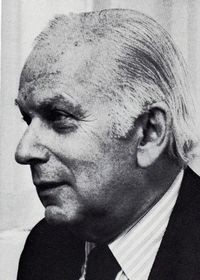 DDB NEWS, JUNE 1974
DDB NEWS, JUNE 1974
INTERVIEWER: I know that every publisher in America has asked you to write a book.
BERNBACH: But I never said yes before. Now I have. In fact, I'm having lunch with my publisher today.
INTERVIEWER: Why did you always say no before?
BERNBACH: I didn't want to write a hack book.
INTERVIEWER: That hardly seems a possible danger. But why did you say yes this time?
BERNBACH: I spoke to Brendan Gill about some of the ideas that I had for a book, and he found them very exciting. And so while I had felt unsure about agreeing to write a book before, I decided that if a great writer like Brendan Gill was stirred by those ideas, I should do it.
INTERVIEWER: You're not talking about a textbook, are you?
BERNBACH: Oh no, although perhaps it would be used as a maverick text in classrooms. It would of course be a book about communication.
INTERVIEWER: Did you ever want to write fiction?
BERNBACH: No, never.
INTERVIEWER: Why do you think that is so?
BERNBACH: I have no sores to squeeze.
INTERVIEWER: All right then, back to the agency. Do you think DDS has changed in any significant ways in recent years?
BERNBACH: Far less than some people might think. The changes, perhaps, are in the area of working harder than ever to be absolutely certain of what should be said about a product or service. That is essential, and the creative people know it as well as the account management people.
But, then we're back to our original philosophy. What you have to say, however right it is, will not even be niticed unless you say it in a way that hasn't been said before. If all you do is what's been done before-even if it worked before, perhaps especially if it worked before-you are ensuring a loss of effectiveness. Ideas, like a loaf of bread, have to be hot out of the oven to arouse the appetite.
If that was true 25 years ago, think how much more true it is today, when there are vastly more messages bombarding the public, when the violence of events pulls at the attention, when credibility is so low, when consumers are so battered. How do you break through? We say, only with ideas that reach people, that move them, that they respond to, that they Iisten to because they like what they hear. And the taient to do that is the talent of an artist.
Often I have been at dinner parties with well-known writers and painters. I can't tell you how much pleasure it gives me, when they learn that our agency does the Volkswagen advertising, or Polaroid, or Levy's, or... you know the list, that they speak of our advertising as being true art. The remarkable thing is, that art is the most effective way of sell ing products.
INTERVIEWER: Where do we go from here?
BERNBACH: Well, I would say that everyone of us has to set the highest standards for ourselves. I think that every creative person, when he or she has a concept for an ad or a campaign, has to ask, is this good enough? is it truly fresh? is there a better way to say it? if I did it another way would lightning strike?
We believe in the dignity of the person. We don't care about how people dress or what they do after work or how they vote.
But we are aware that if we destroy their work we destroy them, and we are care not to do that.
We just demand quality from them, and I think they should demand the same of themselves.
(fin)